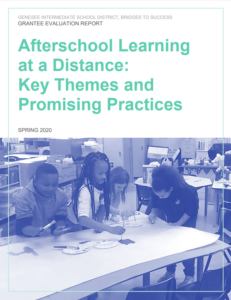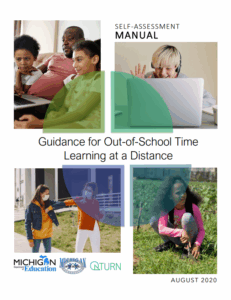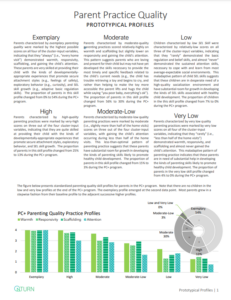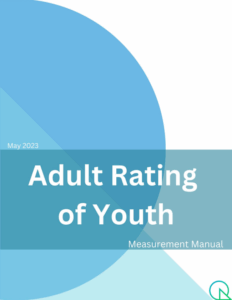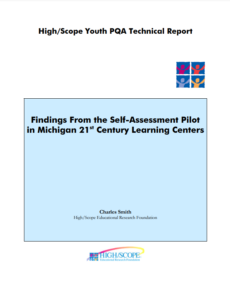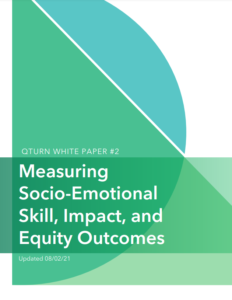Page 4 of 5
Afterschool Learning at a Distance: Key Themes and Promising Practices
This report describes the experiences and practices of Genesee Intermediate School District: Bridges to Success (GISD) Team Leads and direct staff serving children and families after substantially redesigning afterschool programming due to the COVID-19 crisis.
July 12, 2020
Guidance for Out-of-School Time Learning at a Distance
A program quality assessment for 21st Century Community Learning Centers (21st CCLC) and other community-based programs that transitioned virtual, socially distanced in-person, and blended service models. This manual includes: Tool Introduction, Protocol, Standards and Indicators, FAQ, Promising Practices, Method for Development, and Contributors.
August 1, 2020
Parent Practice Quality
A two-page overview explaining our parent practice measures featured in the client report for Newark Trust for Education.
Tags: adult modeling, MPCn model, parenting, pattern-centered analysis, SEL skills
August 20, 2020
Subjective Well-Being (SWB)
The concept of subjective-well-being (SWB) has traditionally been assessed using measures of happiness and satisfaction with life. Most of the measurement instruments developed to assess SWB use several items to assess each of several dimensions.
August 1, 2021
Teacher Practices Instrument (TPI)
QTurn’s Teacher Practices Instrument (TPI) is an observational rating measure designed to assess the quality of teacher (or staff) practices in school classrooms or out-of-school time (OST) programs, build a quality-focused organizational culture, develop improvement goals, identify staff training needs, and provide information about how specific aspects of instructional quality relate to specific aspects of children’s socioemotional skill growth. This measurement tool is applicable to all staff delivering school or OST instruction or other learning experiences and is focused on staff practices that are warm, responsive, scaffolded, and encouraging. Each of the 24 items on the TPI describes a staff practice used to promote the socio-emotional skill growth of children.
March 1, 2022
Adult Rating of Youth (ARY)
The Adult Rating of Youth (ARY) asks staff to rate children’s and youths’ optimal socioemotional behavioral skills based on behaviors displayed during program activities, as observed during several program offering sessions. ARY scores are good indicators of how children and youth are likely to perform in settings where they are well supported. Staff should observe each child or youth for at least four hours of program activities before using the ARY. The ARY can be used as a pre-test for program planning purposes and, also, as a post-test for assessing socio-emotional skill growth.
Youth Report of Socio-Emotional Skills (YRSS)
The Youth Report of Socio-Emotional Skills (YRSS) asks children and youth about mental and behavioral aspects of their socio-emotional skills in general (i.e., beyond the out-of-school time program setting and into environments such as home and school). The YRSS can be used as a pre-test for program planning purposes and, also, as a post-test for assessing socio-emotional skill growth.
Youth Voice for Climate Readiness in Schools
Content and materials from the session Youth Voice for Climate Readiness in Schools, on October 13th, 2023 at the Michigan Afterschool Collaborative – Leadership Summit.
Tags: climate, youth voice
October 13, 2023
Youth Program Quality Self-Assessment Pilot Study
Overall 24 sites within 17 grantees participated in the self-assessment pilot study by assembling staff teams to collect data and score the Youth Program Quality Assessment (PQA). Youth PQA data collected using the self-assessment method demonstrated promising patterns of both internal consistency and concurrent validity with aligned youth survey responses.
Tags: agile analytics, PQA, Self-Assessment
February 7, 2024
Measuring Socio-Emotional Skill, Impact, and Equity Outcomes
We present steps to (a) identify the real objects we seek to represent with measurement and models (i.e., the parts of an individual’s SEL skill set and the type and amount of skill change that is likely to occur during the program) and (b) produce SEL skill indicators and measures that are feasible and valid for both CQI and impact evaluation uses.
Tags: Q-ODM Toolbox, SEL
May 16, 2024
